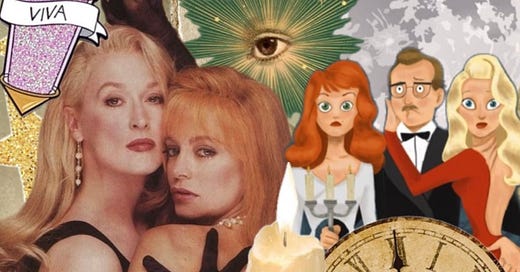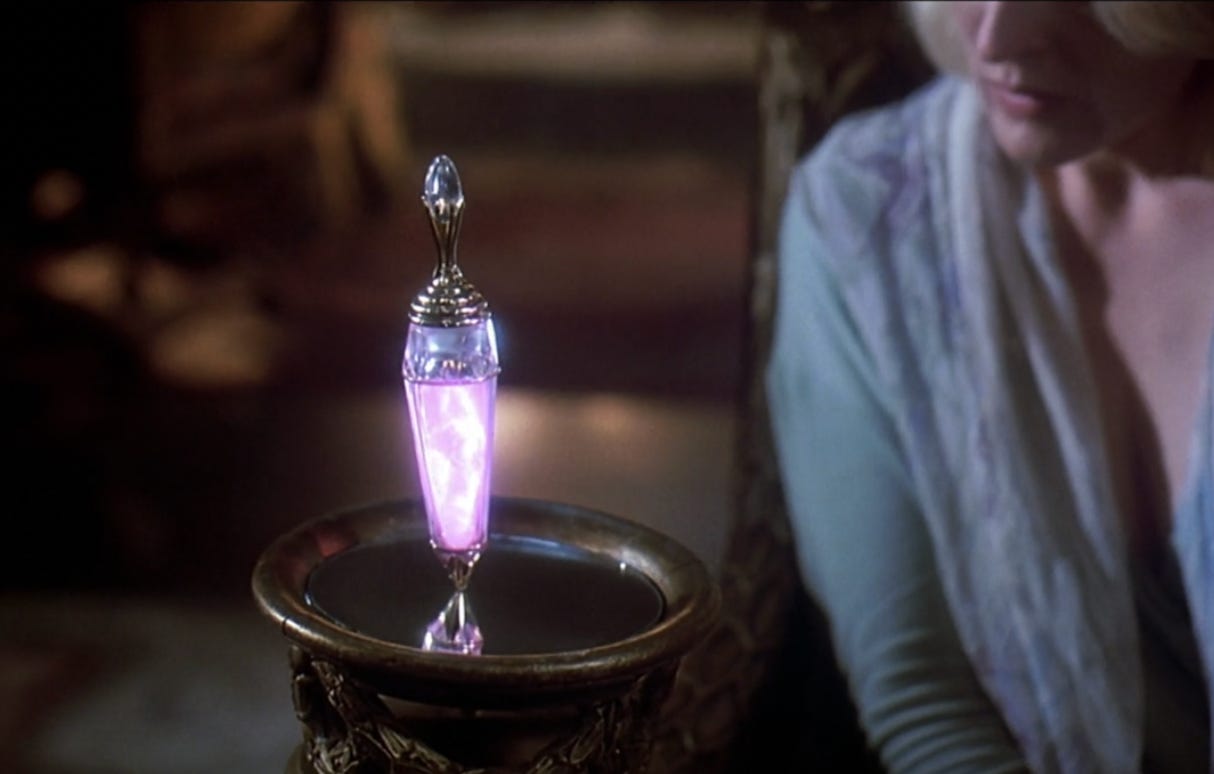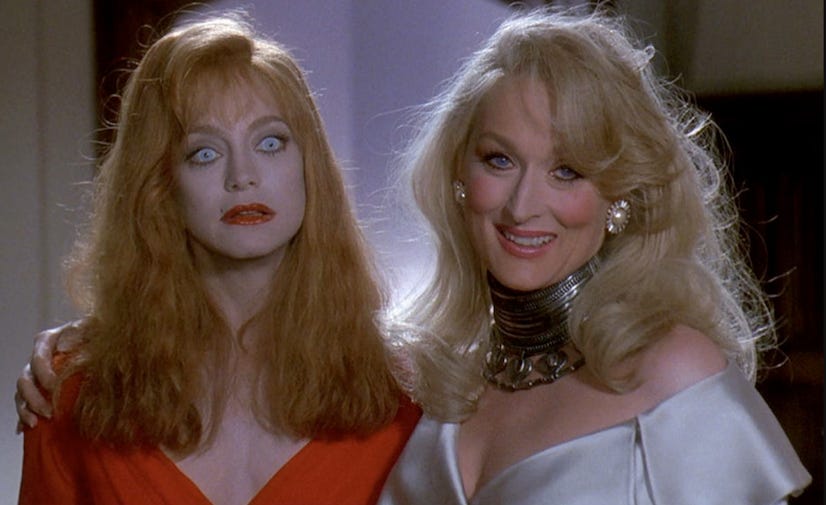Death Becomes Her
This is life’s ultimate cruelty. It offers us a taste of youth and vitality; and then it makes us witness out own decay.
On August 23rd, 2024, Sabrina Carpenter released her sixth studio album, Short n’ Sweet, along with a music video for her new single, “Taste.” The campy video referenced several films, most prominently Death Becomes Her. The 1992 comedy/fantasy film wasn’t a massive hit upon release, but its legacy has exceeded the initial reactions. It’s become a classic among the LGBTQ+ community, and with Carpenter’s massive success this year, the Death Becomes Her references in her music video brought the film back to the forefront of pop culture. What better time than now to discuss it on Movie Mondays?
Aging, Appearance, & Magic Elixirs
Through David Koepp and Martin Donovan’s satirical screenplay and Robert Zemeckis’ directing, Death Becomes Her became a commentary on the stereotypes around appearance and aging, specifically among women. Much of Death Becomes Her would raise some eyebrows in 2024, but in the early 90s, the out-there creative choices helped solidify the message the filmmakers were sending about our society. After Ernest Menville leaves his finacé Helen Sharp for her frenemy, actress Madeline Ashton–Helen notes that several of her partners have left her for Madeline in the past–she ends up alone, overweight, and dragged off to a psych ward due to her unhealthy obsession with her former friend.
“Take care of yourself. You and your body are going to be together a long time, be good to it. Siempre viva; live forever,”-Lisle, Death Becomes Her.
It’s here where I wonder if such a storyline would survive in 2024 society. A woman completely “letting herself go” because a man left her for a more beautiful woman feels a bit out of touch and offensive. However, Helen’s status as an absolutely hideous and undesirable woman sets the film up to address the way society is obsessed with physical appearances. While Helen is getting herself together, Madeline is in a crisis of her own. As she ages, her career is no longer thriving, and she’s searching for a way to make herself beautiful again. This is all too common and has resulted in most women in Hollywood taking extreme measures to prevent themselves from looking older than 25 years old. It doesn’t help that there are men in Hollywood nearing middle-aged dating girls who are barely legal because society has deemed women with even a single wrinkle on their faces disgusting.
This is the message the filmmakers were trying to portray. While it can come across as slightly misogynistic at times, I don’t think this was the intent. After all, Ernest plays a major role in the women’s obsession with their appearance. While he ends up losing his career, becoming an alcoholic, and settling for a job as a reconstructive mortician, Ernest was once a successful plastic surgeon. While Madeline and Helen may spend the movie obsessed with being young and beautiful, as many women in the world do, Ernest is the one who profits off of these insecurities, as real-life plastic surgeons do. The people who are responsible for nose jobs and buccal fat removal and Botox and lip fillers are the ones who perpetuate the cycles.
They are the ones constantly introducing new ways for society to look younger and more attractive, and as the cosmetic surgery industry is projected to reach a value of $59.43 billion by 2030, it doesn’t look like it’s stopping anytime soon. Luckily, there are a lot of public figures and influencers dedicated to spreading messages of self-love and body positivity–one of them being USA Olympian Ilona Maher, who I am rooting for on Dancing With The Stars this season! Unfortunately, in Death Becomes Her, Madeline and Helen only have Lisle as an influence, and she is not a good one.
Madeline is driven to go to Lisle’s house and drink the potion after going to Helen’s book release party and seeing that Helen is now young, thin, and beautiful. Madeline’s arrival at Lisle’s mansion somewhat resembles when Janet and Brad stumble upon Frank-N-Furter’s laboratory in The Rocky Horror Picture Show. In both films, the guests arrive during a rainstorm and are astonished by what they find inside. Lisle’s house exudes sinister energy but is simultaneously alluring. That’s because Lisle possesses a secret elixir that promises anyone who drinks it eternal youth. Lisle even claims to be 71 years old–Isabella Rossellini, who played Lisle, was 39 at the time of filming–but looks significantly younger because of the potion’s effects.
Madeline only later learns that Helen also drank the potion, but when she’s presented with it, she takes it, disregarding potential side effects. I can think of, but respectfully won’t name, quite a few celebrities and non-public figures who would drink the elixir, but that’s beside the point. The point is, like all the things our world offers us to look younger, the potion is viewed as a magic quick fix, and it pries on Madeline and Helen’s deepest insecurities. Unsurprisingly, it doesn’t fix Madeline’s marriage; it doesn’t even help Helen win Ernest back, though they almost get back together.
“Drink that potion, and you’ll never grow even one day older. Don’t drink it and continue to watch yourself rot,”-Lisle, Death Becomes Her.
Instead, when the two are murdered but can’t actually die because of the potion, they live the rest of their lives fighting off their decaying bodies, trying to preserve the youth they were promised when they drank Lisle’s potion. My takeaway is that there is no such thing as eternal youth, no matter what people try. You can either accept aging gracefully and enjoy your life without putting so much emphasis on your appearance or spend the rest of your life fighting off the inevitable, which, as we see with Madeline and Helen, is the much more excruciating option.
Madeline V Helen In The Beauty Olympics
Death Becomes Her intertwines another important moral into the mix: the way in which women are pitted against each other based on beauty standards. At the start of the film, Madeline is the beautiful one that Helen is terrified of losing Ernest to. Helen's beauty declines when Ernest leaves her for Madeline, but when she gets herself together, Madeline becomes threatened by her. If you think the characters spend the rest of the movie battling it out until one of them finally becomes the prettiest and wins the competition, unsurprisingly, you'd be wrong. The fight to be beautiful is a cycle that will never end and one that crowns no winner. Madeline and Helen might think they're in a fight against each other, but they're really in a fight against themselves.
When Helen begins an affair with Ernest, she convinces him it is Madeline's fault that his career fell apart. She even tries to convince him to kill Madeline so they can run away and be together. The plan backfires, and while Madeline and Helen do end up "dead," they continue to fight until they realize they could actually help each other instead–since no one else besides them knows about the elixir. While they don't necessarily end the film as the best of friends, they do, in an unusual way, seem to care about each other, at least enough to not try to kill each other anymore.
Ernest’s Role In Death Becomes Her
As I mentioned, Ernest is not innocent. He’s not a victim caught in the whirlwind of Madeline and Helen’s madness. After all, he chose to leave his fiancé for another woman, and he chose to have an affair with Helen once his relationship with Madeline went downhill. He also planned to kill Madeline and then did it accidentally with little remorse. Ernest also refuses to take responsibility for how his career went downhill and allows Helen to convince him it was somehow Madeline’s fault that he was no longer a successful plastic surgeon. Most of all, Ernest is not exempt from societal pressures either. Toward the end of the film, Ernest almost drinks the same elixir that got Madeline and Helen hooked on eternal youth.
“This man had in his own way learned the secret of eternal life, and it’s here among us in the hearts of his friends and the secret of eternal youth right here in the lives of his children and his grandchildren, and it is my opinion that our beloved Ernest is one man who will indeed live forever,”-Priest, Death Becomes Her.
After seeing how a drop of the potion in a cut on his hand made the skin on his hand younger, he’s intrigued. He almost drinks the whole bottle, knowing that it will make him young again. While women are more likely to be criticized for cosmetic procedures, they are not alone in their obsession with youth. I saw a TikTok recently that compared male actors from the 90s to male actors today. In the old movie scenes, the men had visible forehead wrinkles when they raised their eyebrows. In modern scenes, the men had no movement on their foreheads whatsoever due to the excessive use of Botox. Ernest ultimately decides against taking the elixir, and when he dies, it’s after living a life of integrity instead of the vain life of those who took the elixir.
One of my favorite parts of the film is when Ernest ends up at a party at Lisle’s mansion. When Lisle initially gives Madeline the potion at the start of the film, she tells her she’ll have to disappear from the public eye in 10 years so no one gets suspicious about why she still looks so young. She then suggests other celebrities have done the same. At the party, Ernest bumps into Andy Warhol and Marilyn Monroe and also encounters Elvis and James Dean, addressing real-life conspiracies that a lot of celebrities faked their own deaths in order to escape their celebrity lifestyle. Do I believe these conspiracies? No, and I don’t mean any disrespect to them or their families. But I did find the scene comical. After all, with the obsession society has with youth, who knows what anyone is willing to do to stay young forever.






